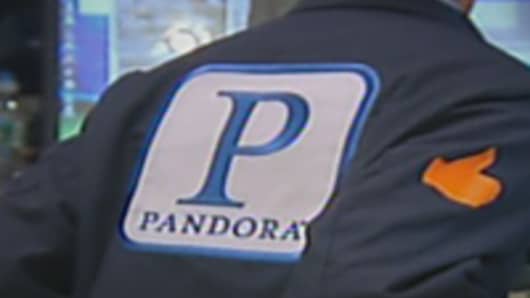Pandora Media shares closed just above its offering price Wednesday after a wild market debut where they soared, then fell, then rose again.
Pandora had sold its initial public offering at $16 per share late Tuesday, twice as much as the Internet radio service expected less than two weeks ago.
Its shares opened at $20 and rose as high as $26, which had given it market value of $4.2 billion, more than the current value of AOL but a fraction of such Internet behemoths as Google or Yahoo .
Then Pandora, with the rest of the market, started falling. Shares of the much-anticipated IPO fell below $20 later Wednesday and closed at $17.42, up 8.9 percent on the day.
"Investors determine the stock price. Let the market work," Pandora Chief Executive Joseph Kennedy told CNBC Wednesday on the New York Stock Exchange floor after the stock opened. "We respect that investors every day, every second set the price."
Kennedy said he also respects "operating margin and cash flow and have been improving that over the past few years but we also have an enormous opportunity ahead of us and we want to fully invest in that opportunity."
Pandora users can listen to the service through computers, smartphones and devices that hook into home entertainment centers.
Kennedy would not predict whether Pandora will be profitable by any particular milestone—for instance, five years—but insisted the company be around a year from now as an independent company.
"Our focus has always been to build a great company. That’s our dream, that’s our passion, that’s our focus," he said.
Pandora, with 3 percent of the market, has lost $92 million since it started as a music-recommendation site called TheSavageBeast.com 11 years ago. Despite offering only about 9 percent of its shares to the public, Pandora has raised twice as much money as it expected two weeks ago.
Despite the growth of music services from a number of companies, notably Apple and Google, Kennedy said most people—80 percent—still listen to music on the radio, and the advertising-supported Pandora is "really focused on that 80 percent."
Kennedy said the major shareholders—including James Feuille of Crosslink Capital with 21.9 percent, Larry Marcus of Walden Venture Capital at 17.8 percent and David Sze of Greylock Partners with 13.4 percent—didn't want to sell their stakes today.
And you can understand why. After the stock's first day of trading, they had pulled in hefty profits: Feuille raked in an estimated $594 million, while Marcus made a not-too-shabby $484 million. Sze got $365 million.
Other large shareholders such as Labrador Ventures, a Silicon Valley-based seed stage fund, landed a whopping $219 million. Pandora CEO Joe Kennedy reaped $72 million.
— Andrea Ludtke and wires contributed to this report.


